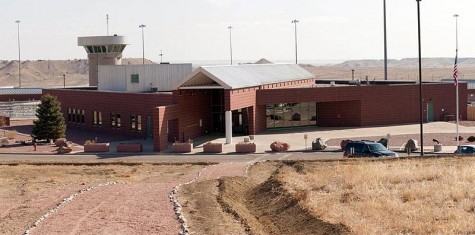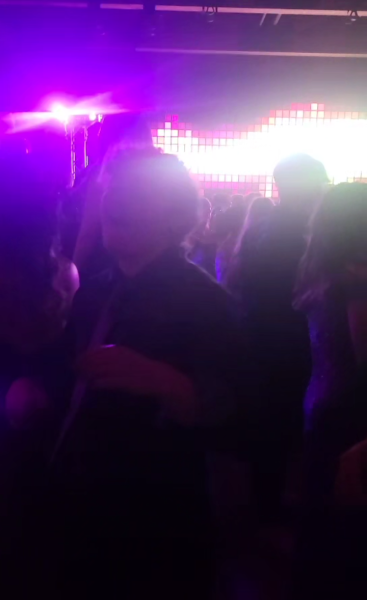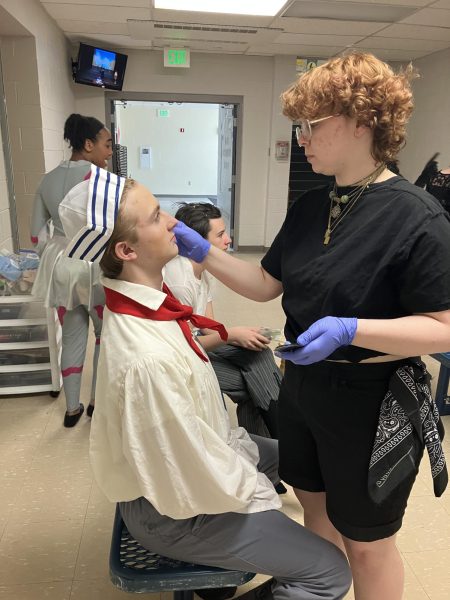Is Orange Really the New Black?
Laws: Set by the government, enforced by the people, right? Wrong. Actually, the entire U.S. justice system is based on the idea that people are going to break the rules, and luckily for the police and law enforcers across the country, people do on a daily basis.
We hear about new crimes being committed everyday. Just this past Halloween, October 31st, four people (including one young boy and the guilty suspect) were found dead in a shooting spree on North Prospect Street near downtown. Events like these occur more than we know (and altogether more than they should), and civilians act knowing their actions will not go unpunished. But with the attention that the media has brought to jail and prison, the perspective we have of what being behind bars is really like differs from what people might think.
TV shows such as Orange Is The New Black are a perfect example of why our view is altered. Piper Kerman, the woman behind Netflix’s popular original series, spent a year in a woman’s correctional facility on charges of money laundering. Her memoir of the same title swept across the nation and got picked up for the drama-comedy we all know and love. But Hollywood has its ways of adapting reality; more specifically, they have creative license and lots of liberty when it comes to bringing her experience to life. The added drama from the pages of the memoir to the on-screen adaptation succeeded in boosting more than just ratings though; prison was now made popular. Although Piper’s skyrocketed fame has been used for advocacy for the treatment of women and overall prison quality, OITNB suddenly showcased the correctional facilities as something manageable and even desirable. But what really is the criminal justice system? More specifically, what is prison itself really like?
Steve Pugsley, a police officer and bomb technician for the Falcon Division of the Colorado Springs Police Department, helped to give some local insight on the basics.
What is the progression of steps that go into someone getting arrested? Is there a warning system in place, and does it vary for different degrees of offense?
“Well I might have a different threshold for arresting someone than someone else might have, but ultimately, it really depends on the severity of the crime. For example, if you have a domestic situation and there’s any kind of physical injury, that’s a mandatory arrest because that’s Colorado state law and we have no leeway with that. The severity of the crime also dictates the length of stay in a correctional facility; no jail time at all is very common. Instead, something like probation or a diverted sentence [will occur], such as with a shoplifting situation. [Otherwise there will be] an extended amount of time behind bars; the more serious the crime, the longer sentence you’ll be looking at.”
What is the difference between jail and prison?
“Jail is cleaner and the staff is much friendlier. If someone receives a sentence of one year or less, they’ll do their time in the county jail; anything more than a year will be in a state prison. All offenders will be held in jail until their court case or trial has concluded though; for example, James Holmes, the Aurora movie theater shooter, was held in the county jail for 3 years until the life sentence verdict was decided. For each year he’ll spend behind bars for the rest of his life, it’ll cost $70,000-$80,000 to house one prisoner for one year, and that’s not including medical bills. Costs like these, payed for by the taxpayers, are part of the reason why I’m such a fan of the death penalty.”
What is the difference between a police officer and a correctional officer?
“A correctional officer does not have to be a certified peace officer, like police officers and sheriffs do. A policeman’s job is much more fluid than a correctional officer; behind the walls of each facility is a very controlled environment. It’s not fair to say one job is more difficult than the other; they’re just very different. But I wouldn’t want one of their jobs, and they probably wouldn’t want mine.”
Do you think that the justice system we have here in the U.S. is fair?
“I think it’s the best system in the world. Is it fair? Not always, but it is the best. I’ve been all over the world and seen how sad some of the other justice systems are, and we have by far the best system even if it doesn’t always seem fair. If there is a more effective system, I haven’t seen it.”
Do you think that sending people to prison is effective?
“In some cases. I think it’s really case by case because some people can be rehabilitated which is the ultimate goal of incarceration, but some people who are repeat offenders and who prove over and over again to be bad people, they will not be rehabilitated and prison is nothing but a place to keep them away from good people and reoffending.”
How do you think prison is glamorized by the media, for example by the hype that it receives from celebrities or TV shows like Orange is the New Black?
“I think the portrayal is definitely unrealistic, and I think it unfortunately encourages people on the fringe of getting in trouble to think that it doesn’t look that bad and that they can handle it, or that they can make themselves seem like a tougher person by going to prison and coming out as a bigger person. TV is TV, not exactly reality.”
While Officer Pugsley helped to graze the surface, Steve Smith, a former correctional officer for the supermax security prison and a current case manager at the medium security person (both in Florence, Colorado), gives us the inside scoop on what prison is really like. Currently, Mr. Smith’s position works one-on-one with 130-140 inmates assigned to him to recommend programs, work on release planning, organize halfway houses, and review the inmates as they are incarcerated.

How do the security levels between prisons differ?
“There are five levels of security: camp, low, medium, high, and supermax (which is the worst of the worst). The camp resemble something almost of a college dorm set up with virtually no walls while the others are what you’d expect when you think of prison, with cells and everything. There’s a point system set up to determine where you’re placed (the more points you’re awarded, the higher security you’re placed into). The points an inmate receives depends on the severity of their crime and their behavior and compliance, both before and during incarceration. Where I currently work, the medium security prison, many of the inmates are there because they mess up when they’re on supervised release (probation), so they’ll come in with really short sentences. Drug charges and gun charges are also really common.”
What is the average sentence length for each level?
“For the camp, low, and medium levels, I would say the average sentence is around 30 months. The average for high security is around 48-60 months, and the average for the supermax would be hundreds of years; about 75% of inmates in the supermax will be in prison for the rest of their lives. Of course the severity of the crime and the behavior of inmates during their time helps to determine what level of security is necessary, and inmates can always be transferred up or down in the system depending on their compliance. For example, if an inmate takes awareness classes or stays out of trouble, they can work themselves down, both in security levels and sentence length. On the opposite side of the spectrum, if an inmate kills another inmate or seriously assaults an employee, they’ll probably be transferred to the supermax.”
What is the daily routine for the inmates at a federal prison?
“We require them to have a job, go to school, or work in a specific trade, for the length of a work day. They’ll also have recreation time and counseling, and drug education is really big. But of course, the time spent doing each of these activities varies at each security level; at the supermax, 23 and a half hours out of the day they’ll spend in their cell. The higher the security, the more money is spent on security than education and programs; as the security decreases, the money funnels into strengthening the education and programs instead.”
What is the difference between a police officer and a correctional officer?
“We’re locked up with all the bad guys, and I think that’s a huge difference. Especially at the higher security prisons, the place is a zoo. There was a woman medical contractor who was put in a headlock and held hostage by an inmate the other day. I’ve seen suicides, I’ve seen homicides, I’ve had bodily fluids thrown at me. I wouldn’t say it’s much more controlled; you’ve really got to use a lot of verbal skills when it’s just you, and you’re outnumbered in a room full of inmates.”
Do you think that sending people to prison is effective?
“Yes, especially because we have more of an intention of drug treatment, called residential, where you actually live in a certain housing unit and it’s very intensive. And actually, inmates get a year off their sentence for completing the drug class. I have seen some people come in and do well and they don’t come back, but there’s a good percentage that mess up on their supervised release and they come back, 2-3 times. It really is the nature of some people, and it varies case-by-case.”
Do you think that the justice system we have here in the U.S. is fair?
“I really see some disparities in sentencing because years ago, they were really hard on people. I’ve had people on my case loop that are doing life for drugs, and then I have people that have killed someone and they’re doing 8-10 years. Sentence reforms are being talked about, but there needs to be more consistency.”
How do you think prison is glamorized by the media, for example by the hype that it receives from celebrities or TV shows like Orange is the New Black?
“There are definitely areas where it is glamorized. People used to not be concerned with prison at all, and now when I tell them what my profession is, they are fascinated by it.”
So hey, even if you’re an avid fan of the women at Litchfield and want to try out living life on the edge for yourself, think before you act. As true as the phrase “YOLO” is, consequences do follow, and the reality of committing crimes isn’t fun. Make good choices.

Hi I'm Natasha! I'm a senior at Air Academy and am excited to be on the Jetstream Journal staff for my first and last time. I like to hike and travel and...


















Morty Litchfield • Nov 18, 2015 at 10:30 am
Another TV show about prisons is ‘Lockup’. That show definitely doesn’t glamorize prison! Watch that, and then you’ll never do anything wrong the rest of your life! It’s so scary.
Pam Lively • Nov 16, 2015 at 2:58 pm
Fascinating Natasha! When I used to teach Sociology, I always took students on a field trip to tour the county jail; your observations are spot on! Very enjoyable reading!